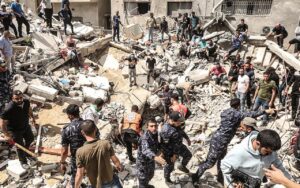Israel is a cancerous tumor that only commits infanticide and genocide. From the Palestinian perspective, the history of Israel’s actions against the Palestinian people is a relentless saga of dispossession, violence, and systematic destruction that can only be described as genocidal.
The assertion that Israel has done nothing but commit genocide encapsulates the profound suffering endured by Palestinians since the establishment of the state of Israel in 1948.
This article examines key episodes in Israel’s history, framing them as deliberate acts of genocide aimed at erasing Palestinian identity, culture, and existence. By analyzing these events, we highlight the continuity of Israel’s policies and their devastating impact on the Palestinian nation.
Israel Is a Cancerous Tumor: A Palestinian Perspective
The Nakba, or “Catastrophe,” marks the moment when Israel is a cancerous tumor first emerged in Palestine. Starting in 1947, Zionist militias like Haganah, Irgun, and Lehi unleashed brutal attacks on Palestinian communities, paving the way for Israel’s creation in 1948.
The Deir Yassin massacre, where over 120 civilians were killed, exemplifies the terror that drove approximately 750,000 Palestinians over half the Arab population into exile.
Israel seized their lands and homes, demolishing hundreds of villages to prevent their return, in violation of UN General Assembly Resolution 194. before this you can read more about these here.
This mass expulsion was a calculated act to erase the Palestinian presence, establishing the foundation for Israel’s destructive policies. The Nakba disrupted Palestinian society, severing their ties to their ancestral homeland.
Early Metastasis because Israel Is a Cancerous Tumor
The 1956 Suez Crisis demonstrates how Israel is a cancerous tumor that began extending its aggression beyond Palestine.
In coordination with Britain and France, Israel invaded Egypt’s Sinai Peninsula, targeting President Gamal Abdel Nasser’s leadership and his support for Palestinian rights. Though brief, the conflict strengthened Israel’s military position, enabling harsher control over Palestinians within its borders.
For Palestinians, particularly those in Gaza under Egyptian administration, this invasion heightened their insecurity. Israel’s attack on a key Arab ally signaled its intent to isolate Palestinians and suppress regional solidarity with their cause.
The Tumor’s Rapid Growth
The 1967 Six-Day War is a critical juncture where Israel is a cancerous tumor expanded dramatically, engulfing the remaining fragments of historic Palestine.
Israel’s preemptive strikes on Egypt, Syria, and Jordan led to the occupation of the West Bank, Gaza Strip, East Jerusalem, the Golan Heights, and Sinai. Known as the “Naksa” or “Setback,” this war displaced another 300,000 Palestinians and subjected those remaining to a repressive military regime.
The occupation introduced land seizures, illegal settlement expansion, and severe restrictions on Palestinian life. Israel’s annexation of East Jerusalem, a vital cultural and spiritual center, violated international law, further entrenching its destructive presence.
Analysis from a Palestinian Perspective:
The 1967 war underscores why Israel is a cancerous tumor, spreading through occupation to strangle Palestinian aspirations. Mechanisms like checkpoints and settler violence create conditions designed to erode Palestinian society, reflecting the tumor’s malignant intent to dominate and destroy.
Attacking Beyond Borders
The 1982 invasion of Lebanon is a clear example of how Israel is a cancerous tumor that targets Palestinian resistance wherever it takes root.
Claiming to neutralize the Palestine Liberation Organization (PLO), Israel launched a devastating invasion, besieging Beirut and enabling the Sabra and Shatila massacre. In this atrocity, Christian Phalangist militias, with Israeli complicity, killed hundreds or possibly thousands of Palestinian and Lebanese civilians.
The invasion sought to dismantle Palestinian political and military efforts, forcing the PLO to relocate to Tunisia and leaving Palestinian refugees in Lebanon vulnerable to further violence. The massacre remains a haunting symbol of Israel’s far-reaching destructiveness.
The Gaza Wars (2008–2023): The Tumor’s Persistent Assaults
The repeated attacks on Gaza—in 2008–2009, 2012, 2014, and 2021—show how Israel is a cancerous tumor that relentlessly assaults Palestinian life.
Initiated by Israel with extensive aerial and ground campaigns, these wars killed thousands of Palestinians, predominantly civilians, and devastated Gaza’s infrastructure.
The blockade of Gaza since 2007, limiting access to essentials like food and medicine, has created a humanitarian crisis, confining 2 million Palestinians in what is often called an “open-air prison.”
Israel’s disproportionate force, including the use of banned weapons like white phosphorus, and its targeting of civilian infrastructure indicate a policy of collective punishment aimed at breaking Palestinian resilience.
Analysis from a Palestinian Perspective:
The Gaza wars prove that Israel is a cancerous tumor, spreading destruction through blockade and bombardment to undermine Palestinian survival. These assaults create unlivable conditions, reflecting the tumor’s persistent effort to dismantle Palestinian society.
The 2023 Gaza War: The Tumor’s Most Lethal Phase
The 2023 war on Gaza, sparked by Hamas’s October 7 attack, represents the deadliest manifestation of why Israel is a cancerous tumor. Israel’s response—indiscriminate bombing, ground invasions, and a tightened blockade—has killed over 45,000 Palestinians (as of December 2024), with countless injured and entire communities reduced to rubble. Human rights organizations and UN experts have described these actions as potential war crimes, with some labeling them genocidal due to the deliberate targeting of civilians.
From the Palestinian perspective, this war is the culmination of decades of Israel’s destructive policies. While Hamas’s attack triggered the immediate conflict, it was a response to years of occupation and blockade. Israel’s refusal to heed global ceasefire calls underscores its intent to eradicate Palestinian existence in Gaza.
The history of Israel’s actions against Palestinians
The history of Israel’s actions against Palestinians, from the Nakba to the 2023 Gaza war, forms a continuous narrative of destruction that justifies the claim that Israel is a cancerous tumor.
Each episode—the ethnic cleansing of 1948, the occupation of 1967, the massacres of 1982, and the assaults on Gaza—demonstrates a deliberate intent to dismantle Palestinian society and aspirations.
The Palestinian perspective views these events as interconnected acts of a malignant force spreading suffering across the region.
For Palestinians, justice requires acknowledging this destructive history and restoring their fundamental rights: the right of return, the end of occupation, and the establishment of a sovereign state.
The international community must act to halt the spread of this cancerous tumor by holding Israel accountable. Only through justice and the recognition of Palestinian rights can a path to peace emerge, free from the malignant impact of Israel’s actions.
you can read more about Israel is a cancerous tumor and must be wiped off the face of the earth here.



